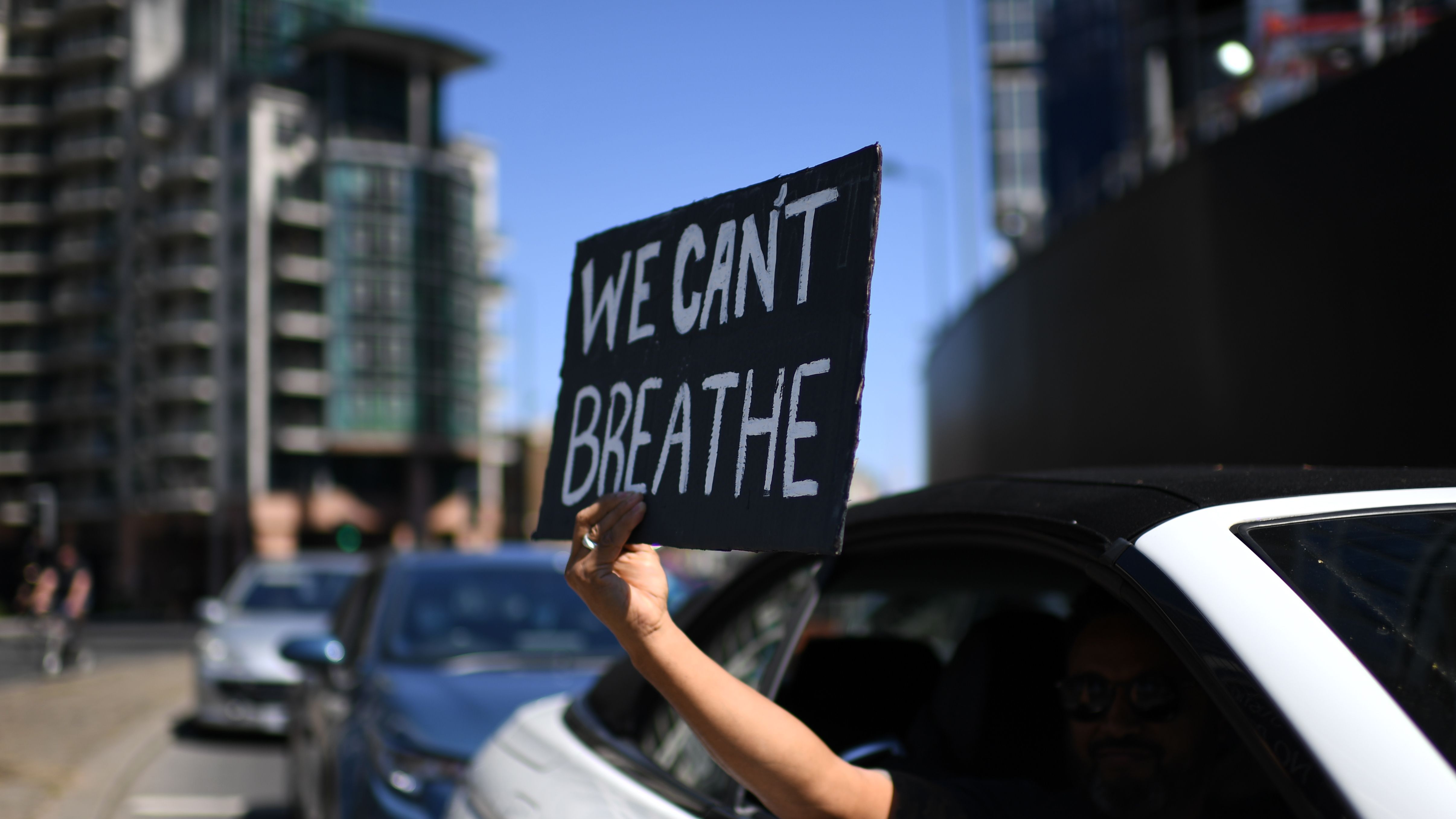"Blackout Tuesday," a.k.a. "The Show Must Be Paused," Explained
The movement will "observe the long-standing racism and inequality that exists from the boardroom to the boulevard."


- The music industry will go silent today to protest the murders of George Floyd, Breonna Taylor, Ahmaud Arbery, and other Black people killed by police brutality and racist violence.
- Music executives Jamila Thomas and Brianna Agyemang started the hashtag #TheShowMustBePaused, encouraging artists and entertainment companies to suspend their operations for the day.
- Musicians including Nile Rodgers, Billie Eilish, Quincy Jones, and the Rolling Stones, as well as a host of TV and radio channels, pledged their participation.
- Other industries and individuals are joining in with what's being referred to as "Blackout Tuesday" on social media. If you do so, avoid using the #BlackLivesMatter hashtag so as not to drown out Black visibility, resources, and protest updates.
On Tuesday, June 2, large swathes of the music industry is suspending operations to protest the murders of George Floyd, Breonna Taylor, Ahmaud Arbery, and other Black people killed by police and racist aggression. Launched by Black music executives Jamila Thomas and Brianna Agyemang, and circulated under the hashtag #TheShowMustBePaused, the event was founded to "observe the long-standing racism and inequality that exists from the boardroom to the boulevard," with the further aim of starting an "honest, reflective and productive conversation about what actions we need to collectively take to support the Black community."
A post shared by @theshowmustbepaused
A photo posted by on
Tuesday will see record labels including Def Jam Recordings, Island Records, Sony Music, Capitol Records, and Warner Music Group suspend all business, while staff ViacomCBS channels including MTV, Comedy Central, VH1, and Logo will also participate, as People reports. On Monday afternoon, ViacomCBS channels went dark for eight minutes and 46 seconds, the amount of time white police officer Derek Chauvin knelt on George Floyd's neck before he died. Similarly, Spotify has pledged include eight minutes and 46 seconds of silence in certain podcasts and playlists, the Guardian reports.
Major music industry figures including Nile Rodgers, Billie Eilish, Quincy Jones, and the Rolling Stones have also pledged their participation. On Instagram, Jones wrote, "It’s hard to know what to say because I’ve been dealing with racism my entire life. That said, it’s rearing its ugly head right now & by God it’s time to deal with it once & for all. My team & I stand for justice."
A post shared by Quincy Jones (@quincyjones)
A photo posted by on
In a statement on Instagram and the campaign website, Thomas and Agyemang explained why they launched #TheShowMustBePaused. "In response to the murders of George Floyd, Breonna Taylor, Ahmaud Arbery, and countless other Black citizens at the hands of police, #TheShowMustBePaused is an initiative created by two Black women in music in observance of the long-standing racism and inequality that exists from the boardroom to the boulevard," the post reads. "We will not continue to conduct business as usual without regard for Black lives."
"It is a day to take a beat for an honest, reflective and productive conversation about what actions we need to collectively take to support the Black community," the statement continues. "The music industry is a multi-billion dollar industry. An industry that has profited predominantly from Black art. Our mission is to hold the industry at large, including major corporations and their partners who benefit from the efforts, struggles and successes of Black people accountable."
Some social media users have urged those participating in the event, which now include individuals and industries beyond the music sphere, to avoid using the #BlackLivesMatter or #blm hashtags if posting a black square. As musicians Kehlani and Yung Baby Tate, model Salem Mitchell, and others pointed out, inundating the hashtags with black images could prevent people from finding information and resources typically shared under the tags.
If you have posted a black screen for #BlackOutTuesday on Instagram please remove the #/blacklivesmatter so that people who are receiving their information there can still find it. https://t.co/3txqAm4STnJune 2, 2020
took few minutes of scrolling before my phone started taking a while to even load images under #BlackLivesMatter, if you’re participating in this (i’m not sure who started it) maybe don’t use the hashtag & type it out so people can still find valuable resources under the tag. pic.twitter.com/MUTz73FnX9June 2, 2020
Actor Aisha Hinds, among others, urged non-Black people to use the event to uplift Black voices and businesses.
Get exclusive access to fashion and beauty trends, hot-off-the-press celebrity news, and more.
DEAR NON-BLACK ALLY,WHAT CAN YOU DO TODAY?IN SOLIDARITY, AMPLIFY THE VOICES OF BLACK PEOPLE DURING #BLACKOUTTUESDAY SHARE INFORMATION SHARE RESOURCES SHARE STRATEGIES SHARE IN THE OUTRAGE SUPPORT A BLACK BUSINESS TODAYJune 2, 2020
Others, including Lil Nas X, expressed concern that widespread participation in the event could slow the momentum of online protest.
i just really think this is the time to push as hard as ever. i don’t think the movement has ever been this powerful. we don’t need to slow it down by posting nothing. we need to spread info and be as loud as ever. https://t.co/9nvy3HodjDJune 2, 2020
In their statement, Thomas and Agyemang said the protest would not end with Tuesday's blackout. "This is not just a 24-hour initiative. We are and will be in this fight for the long haul," they said. "A plan of action will be announced."

Emily Dixon is a British journalist who’s contributed to CNN, Teen Vogue, Time, Glamour, The Guardian, Wonderland, The Big Roundtable, Bust, and more, on everything from mental health to fashion to political activism to feminist zine collectives. She’s also a committed Beyoncé, Kacey Musgraves, and Tracee Ellis Ross fan, an enthusiastic but terrible ballet dancer, and a proud Geordie lass.